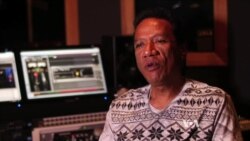In Myanmar, also known as Burma, thousands of refugees have returned home in recent years, drawn by democratic changes, a growing economy and loosened restrictions on political freedoms.
But not everyone is welcome. One former activist remains in exile, despite his desire to return.
In northern Thailand, exiled Kachin musician Mun Aung has a message of peace for his fans in Yangon.
But the former '88 Generation activist, who fled to Norway 26 years, ago will not be delivering the message in person. He was recently denied a visa to enter Myanmar, without being given an official reason.
“Maybe they think that we are going to cause problems or trouble in the country. I just recently finished recording my new album, which is called "Raindrops of Peace." My dream was to perform a concert in public, a kind of fund-rising concert for Kachin Refugees," he explained.
About 100,000 civilians are facing a fourth Christmas in primitive camps in rebel-controlled areas of Kachin state. The Kachin fighters are the only ethnic army that has not signed a cease-fire agreement.
Talks faltered recently, following a government artillery attack on a Kachin training center that killed 23 cadets.
The Kachin's perpetual struggles are familiar to Mun Aung who grew up as a child in the conflict zone.
“The problem in Burma today is the power sharing because the power has been in military or previous military government or so-called governments in last 50 years," Mun Aung said. "All the state, the power and authority, everything has been in the hands of the military. So it is the military decision whether they want to give up the power or not.”
Mun Aung's music has long been an anthem for pro-democracy protesters. That is likely part of the reason he cannot go back. But he remains popular, even in exile. During an ethnic festival on the Thai-Myanmar border, Kachin singers raising money for people displaced by fighting invited him on-stage to play a few classics.
For now, he looks on the bright side of Myanmar's reforms, even if he cannot witness them.
“When I released 'Battle for Peace' album in 1992, it was very difficult because it was considered as illegal, so everyone who owned my cassette or copy of the album could go to jail," Mun Aung said. "But this time, for me to release a new album, I hope it will be easier than 20 years ago because now it sounds like there is no restriction on distribution of music such as censorship and permission from authorities to release a new album.”
While Mun Aung is set to return to his family in Norway, his thoughts of peace will remain here with his people.





